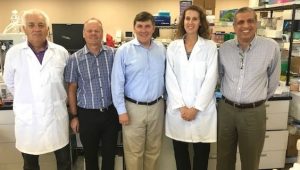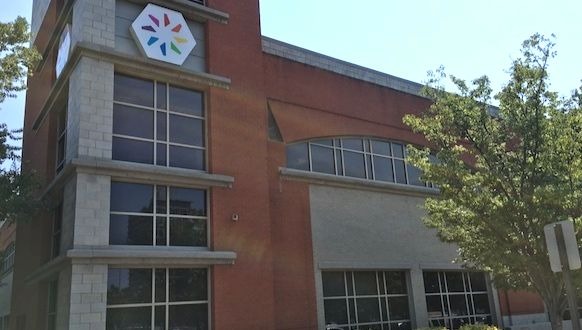A local health care tech company is looking for a big dose of cash as it ramps up operations to capitalize on a new cancer treatment method.
GPB Scientific, which is based downtown and makes a device that helps separate and extract certain cells from people’s blood, has opened a $10 million capital raise.
As of a June 6 SEC filing, the company had gathered $500,000 toward that goal.
Founder and managing member Mike Grisham said GPB’s devices have the ability to separate different types of blood cells with high efficiency, which is coveted by labs and others running clinical trials in light of recent breakthroughs in cancer treatment, specifically a method involving so-called T-cells.
Grisham explained the mechanics of the company’s methods in layman’s terms.
“In your blood you have various types of cells like red, white, all that,” Grisham said. “And you have CAR-T cells, which are your attack cells. When a bacteria or virus invades your body, the T-cells go recognize it and go kill it.”

From left: GPB’s Roberto Campos-Gonzalez, Tony Ward, Jason Walsh, Alison Skelley and Khushroo Gandhi. Photo: GPB Scientific
Being able to separate T-cells from blood without damaging them is useful for a new type of cancer treatment, in which other labs take T-cells, modify them and use them to attack cancer.
“Cancer, as it mutates, can hide from your immune system, which includes your T-cells,” Grisham said. “My layman’s version is (other labs) put night-vision goggles on the T-cells and put them back in your body and the T-cells go, ‘A-ha! Cancer!’ and they go after it.”
Grisham, who serves as chairman for GPB and works full time at a local nonprofit, said the FDA recently approved the treatment method.
Prior to working toward cell separation, GPB had developed two other nanotechnology companies that it sold off. Grisham said the company is not yet profitable and has been financed through angel investors and grants from the National Institutes of Health.
With the new treatment cleared and hundreds of clinical trials on it underway, the demand for separated T-cells is rising. Grisham said GPB’s technology has the potential to help reduce treatment time and improve patient outcomes.
“There are going to be tens of thousands of patients that’ll need to go through the process of taking T-cells out,” he said.
GPB, which stands for “get people better,” will use the money from the capital raise to scale up manufacturing and finance clinical trials of the new treatment.
Founded in 2002, the company is based in the VA Bio+Tech Park at 800 E. Leigh St. and has an office in San Diego. Grisham said GPB has seven employees across both locations.
Grisham is bullish on what the new treatment could mean for the future of cancer treatment.
“The first two trials are going after blood-based cancers like leukemia and lymphoma patients who are at the end stages,” he said. “They tried these T-cell therapies and for a huge percentage of them, like 70 or 80 percent, it totally eliminated the cancer. It’s unbelievable.”
A local health care tech company is looking for a big dose of cash as it ramps up operations to capitalize on a new cancer treatment method.
GPB Scientific, which is based downtown and makes a device that helps separate and extract certain cells from people’s blood, has opened a $10 million capital raise.
As of a June 6 SEC filing, the company had gathered $500,000 toward that goal.
Founder and managing member Mike Grisham said GPB’s devices have the ability to separate different types of blood cells with high efficiency, which is coveted by labs and others running clinical trials in light of recent breakthroughs in cancer treatment, specifically a method involving so-called T-cells.
Grisham explained the mechanics of the company’s methods in layman’s terms.
“In your blood you have various types of cells like red, white, all that,” Grisham said. “And you have CAR-T cells, which are your attack cells. When a bacteria or virus invades your body, the T-cells go recognize it and go kill it.”

From left: GPB’s Roberto Campos-Gonzalez, Tony Ward, Jason Walsh, Alison Skelley and Khushroo Gandhi. Photo: GPB Scientific
Being able to separate T-cells from blood without damaging them is useful for a new type of cancer treatment, in which other labs take T-cells, modify them and use them to attack cancer.
“Cancer, as it mutates, can hide from your immune system, which includes your T-cells,” Grisham said. “My layman’s version is (other labs) put night-vision goggles on the T-cells and put them back in your body and the T-cells go, ‘A-ha! Cancer!’ and they go after it.”
Grisham, who serves as chairman for GPB and works full time at a local nonprofit, said the FDA recently approved the treatment method.
Prior to working toward cell separation, GPB had developed two other nanotechnology companies that it sold off. Grisham said the company is not yet profitable and has been financed through angel investors and grants from the National Institutes of Health.
With the new treatment cleared and hundreds of clinical trials on it underway, the demand for separated T-cells is rising. Grisham said GPB’s technology has the potential to help reduce treatment time and improve patient outcomes.
“There are going to be tens of thousands of patients that’ll need to go through the process of taking T-cells out,” he said.
GPB, which stands for “get people better,” will use the money from the capital raise to scale up manufacturing and finance clinical trials of the new treatment.
Founded in 2002, the company is based in the VA Bio+Tech Park at 800 E. Leigh St. and has an office in San Diego. Grisham said GPB has seven employees across both locations.
Grisham is bullish on what the new treatment could mean for the future of cancer treatment.
“The first two trials are going after blood-based cancers like leukemia and lymphoma patients who are at the end stages,” he said. “They tried these T-cell therapies and for a huge percentage of them, like 70 or 80 percent, it totally eliminated the cancer. It’s unbelievable.”



